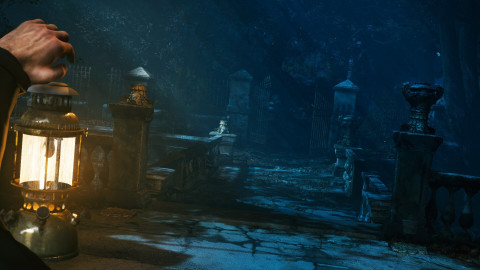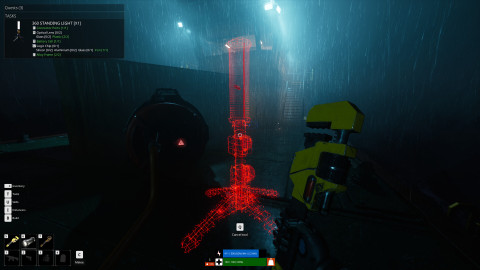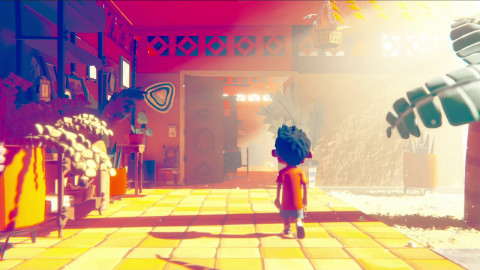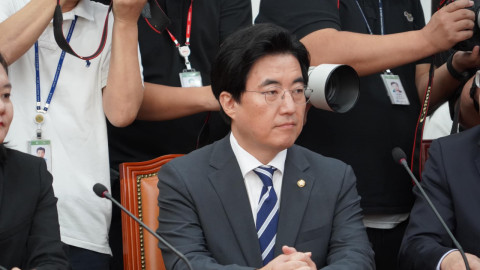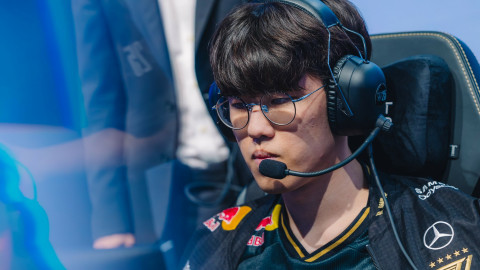
Some people fill their lives with their job -- their career is what they live and die for. And then there’s people like Andrey “Reynad” Yanyuk who ideally cram three full-time jobs in a day. Because aside from being the CEO of Tempo Storm, he streams, competes, and, oh yeah, he’s also designing his own game. The person scheduling such a crammed agenda should be anything but envied -- then again, he probably does that himself too.
We sat down with the entrepreneur for a look behind Tempo Storm and the man himself. Reynad opened up about the dreams he had for Tempo Storm, what the biggest hurdles were in the past - and are now -- to achieve those dreams, and the life lessons he has learned in the ever-changing landscape of modern-day media.
This is part one of our two-part interview with Reynad. Part two focuses on Reynad's personal journey from full-time streamer to CEO, including his handling of bad Reddit press.

Take me back to the moment you decided to found Tempo Storm. Do you remember the vision you had for the organization?
Back then the vision was to make the biggest esports organization in the world. I was very ambitious about it; I think you have to be if you decide to start a company. There wasn't that much money in esports and I was getting offers from a bunch of teams to play for them. I just decided to take the risk instead and start my own company.
I had a quick rise on Twitch. I've been streaming since 2012, but at the end of 2013 the Hearthstone beta started and I got a lot more viewers. I went from one hundred viewers to up to ten thousand quickly. A few months after that the esports teams started sending offers. I was really unhappy with those, because I had crazy viewership -- twenty thousand concurrent viewers -- and those teams were offering me just $2000 per month. I just thought that was ridiculous, so I started Tempo Storm instead.
Besides the offered payment, what did you think was missing in other esports organizations back then?
I didn't think that they marketed around the players much back then. It was all about the team results and streaming, it wasn't about telling the players' stories. When it came to TSM or CLG, it was all about how they were doing in LCS. It was team-based media. Tempo Storm -- at least early on -- tried to focus on the individual players a lot when it came to the marketing.
“I think that the sports team model just doesn't really work for esports. The audience is too different--it's just not how they like to consume their content.”
The teams that were around were pretty good -- a lot of them are some of the most successful esports companies to this day. I didn't think [Tempo Storm] was doing anything too differently. I guess the biggest thing that we were going to do was focus on other games.
Back then, only League of Legends was what mattered. Every single sponsor in the space only cared about LoL. And it had the highest viewership numbers, it was getting like three hundred thousand concurrent [viewers] every weekend. It was crazy. League was at its peak in 2015. But for us, we just wanted to do Hearthstone because it's a game that not a lot of other people and teams saw as a real esport.

In an interview earlier this year you said Tempo Storm is more focused on the entertainment side, whereas other esports teams take the classic sports team approach. Was that something you envisioned from the start as well?
Yeah, I wanted it to be more of a media company and less of a sports team. I think that the sports team model just doesn't really work for esports. The audience is too different--it's just not how they like to consume their content.
In traditional sports you have a franchised league, you have the sport that's adopted from high school and collegiate level. Esports didn't really have franchised leagues then, and the fans didn't want to spend money to go to a stadium every week. They'd go to a big tournament like Worlds, but they didn't want to spend money to go out and watch a game every week.
"There are companies that exist for two years until they burn through their cash,
and then they disappear. Those companies are upsetting the ecosystem."
They like to be on Twitch, they like to be memeing in chat, they like to follow their players on social media... it's just a different audience. I saw it more as an entertainment industry rather than sports. I still see it that way, and I think that still applies to most esports.
Some companies have tried to force the whole sports angle with things like the Overwatch League, but I don't really believe in that model. The numbers are wrong, that's the big thing. A lot of those leagues ride the hype of esports, but the numbers of their fans don't back up the prices that they're asking for.
With every company there are ups and downs. I'm interested in hearing what the hurdles were when you started Tempo Storm, but you look back at as minor issues compared to what you have to deal with now.
In the beginning, we had fewer players on the team. We started with three people. So whenever I had an issue with an individual player who refused to do something that's in their contract, it seemed like the end of the world. I didn't know how to deal with it. And you know, if you have one of your players, on a three player team, not pulling their weight, that's a third of your company underperforming.
Today I know how to deal with those problems a lot better. The company has also grown -- we now have around forty players, so it's not as big of a problem anymore if one of them has an issue. We can make the changes that we need to make then. So yeah, individual player drama was the biggest thing back then. Drama inside of teams--maybe the players didn't like each other? Things like that seemed like the end of the world.

What are the hurdles now?
Now, the amount of dumb money that is in esports is a big problem. Esports became very hyped-up; the mainstream media got a hold of it. What kind of happened in 2016 is that you got a lot of these people from the start-up world that gravitated towards esports. They don't know anything about the scene or the fans, but they understand that there's hype there and that it's easier to raise money for esports.
So they came in with terrible ideas, raised several million dollars for it. They basically created this weird ecosystem where everything is funded by investor money, and everybody is losing cash. That's made it very annoying, because certain games are out of reach for that reason.
“Blizzard and Riot are doing what's best for Blizzard and Riot.
What they're doing has benefited them greatly, but it's hurting the ecosystem.”
Tempo Storm's probably not going to be in League of Legends or Overwatch, for example. Not just because of the franchise model, mostly because of the pricing. I'd say that is probably the biggest hurdle right now in esports.
There are companies that exist for two years until they burn through their cash, and then they disappear. Those companies are upsetting the ecosystem. They're making it very hard to run a sustainable business, compared to before.

Is that something you see fix itself over time, or do those companies like Blizzard and Riot need to take an active approach?
[Laughs] Well, I think Blizzard and Riot are the biggest culprits, they're the ones causing it. But Blizzard and Riot are doing what's best for Blizzard and Riot. What they're doing has benefitted them greatly, but it's hurting the ecosystem. They're not going to change. They realize what they're doing -- they're doing it intentionally. There is no incentive for them to change either. No, they did what's best for their company.
I think it will get fixed over time. You can only run an unsustainable business for so long. Once the investor's dollars dry up for a lot of these companies -- I'm talking mostly about start-ups now -- those companies do get weeded out. We've already seen some of that happening, and I think that trend will continue. Esports is just kind of in a bubble now, and once that settles, the companies with the most intrinsic value are going to rise to the top.
And Tempo Storm will be one of them?
Hopefully. I don't think we're the biggest company in the world, but everything we do is sustainable. That's very rare in esports. When we spend money on something, we make that money back every time. Tempo Storm tries to be diversified and sustainable, responsible with how we spend money. I think that makes us more immune to any swings in the ecosystem, and it makes us more agile.
At the same time, if a company comes in and raises 40 million dollars to do something ridiculous, that's going to look like more of a success in the short term. I just think there's a lot of esports teams that will get weeded out with time.
“What it will look like when it cracks? I don't know.
I know that it will involve a lot of people getting fired”
Are those the teams with a sports model?
No, some of the teams that have a sports team model are doing very well. It's not about what your business model is like, it's more about execution. Are you overpaying for things? Are you spending money on something that is never going to bring returns? Are you hiring good people and investing in the right games?
A lot of companies raise a bunch of money to be involved in the biggest games, but the biggest games have the lowest return on your investment, in general. That kind of market can only be sustainable for a limited time. I just think everything is going to self-correct in the next year, year and half.

That's soon. What will that self-correction of unsustainability in esports look like?
Yeah, that's very, very soon. I personally think it's going to start with Overwatch. I'm not gonna speculate on what Blizzard is gonna do, but I know what player count numbers look like, and I know that certain things in esports are unsustainable.
What it will look like when it cracks? I don't know. I know that it will involve a lot of people getting fired, I know that you'll see something similar to what we just saw with HGC. An announcement of "Hey, we're going to scale back for a bit." That's going to be a trend.
You'll also stop seeing small games trying to do esports. A lot of smaller developers are jumping on the train, saying they're doing an esports league. I think you're going to see less and less of that. I think you'll see fewer traditional sports companies come into the space and try to do esports leagues. The things that are profitable are going to stay around, and the things that are losing money are going to be separated from the herd very quickly.
"...it's moving Tempo Storm to be more like Disney and less like a sports team. The idea is that we're a media company, and instead of movies being our flagship product it will be games."
But once those smaller games are gone, who's to say another small game isn't going to try take its place and try to be successful in esports?
More and more games will try to take the place, yeah. What you see though, is that there is a lot of experimentation with esports. When a new developer launches a game, they'll say: "Ok, we're gonna take some of our marketing budget and we're going to do some esports stuff." So they'll try it with their first game, they'll see what the actual return on that investment is, and if it wasn't as successful as they envisioned, they won't organize a league for their next game. The same publisher isn't going to keep making a league for every game that they launch. But you're right, new publishers could try, yes.
I asked you what your dream was when you founded Tempo Storm -- how far along in achieving that dream are you?
A lot further than I thought we'd be at this point! The dream was to make a media company, right? It started with just the players and the brand, the competition. And then we expanded into the full media company at the end of last year or so. We built a production team, with a studio, up in Hollywood, where we started doing a lot of live events and also online productions.
We've started working with a lot of big companies and clients. We've started game development a year ago... All of these things were really big steps for the company, and it's moving Tempo Storm to be more like Disney and less like a sports team. The idea is that we're a media company, and instead of movies being our flagship product it will be games. I think Tempo Storm is really far along in that model. We'll see how it works after we launch our game, but I'm very optimistic about it.
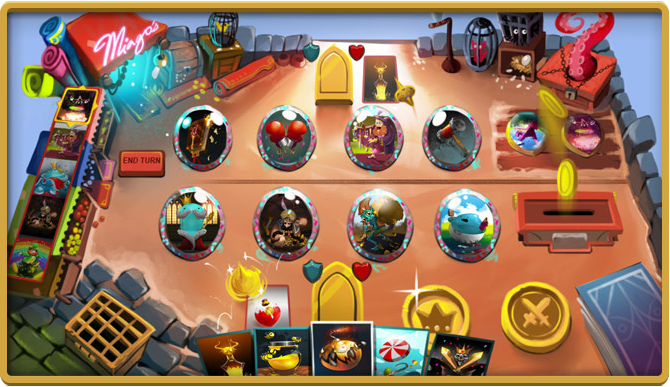
Can you give me a percentage to give an idea how far into reaching the goal you are?
Well, the vision is really, really big. So I would say we're 15%-20% there. It really depends. If the vision is to be a successful esports media company, we're already there. If the vision is to be the biggest in the entire space... we're getting there, but I'd say we're like 20% along the way there. But that's a lot of work. It just depends on where you draw the line.
Four years ago when I made the company I didn't have a very specific goal where I'd say "five years from now we're going to this and this." I just wanted a successful media company, and I think that is something we've already achieved.
For me, the big goal is to be the number one media company in the space. Once we reach that point, the goal is staying number one. We're getting closer every day, but it's a big goal to have right? That would be a company that needs to be valued at, like, 300 million dollars or something.
. . .
Header image by Red Bull Esports.
-

Storyteller by heart. If something is competitive, I am interested in it.
Sort by:
Comments :0

